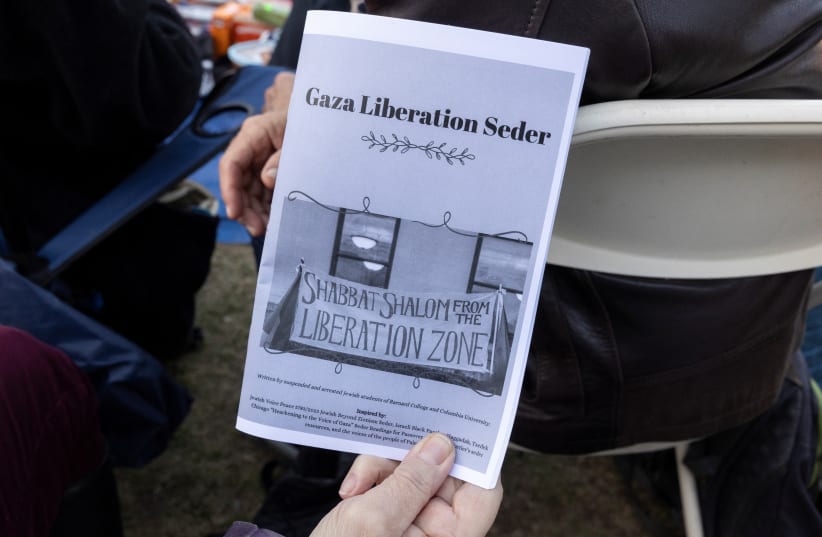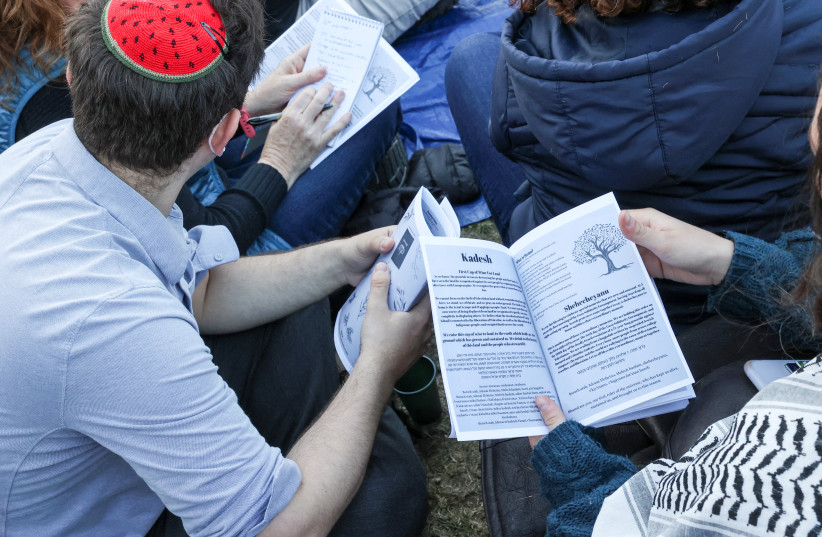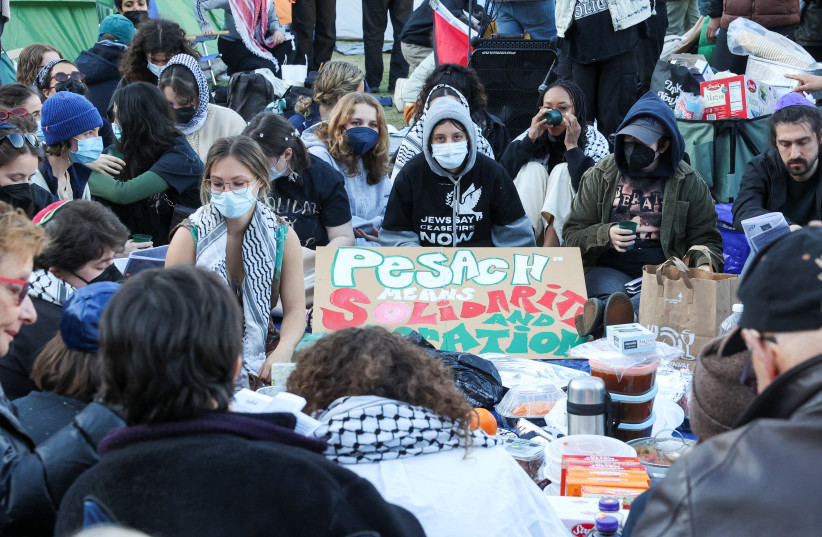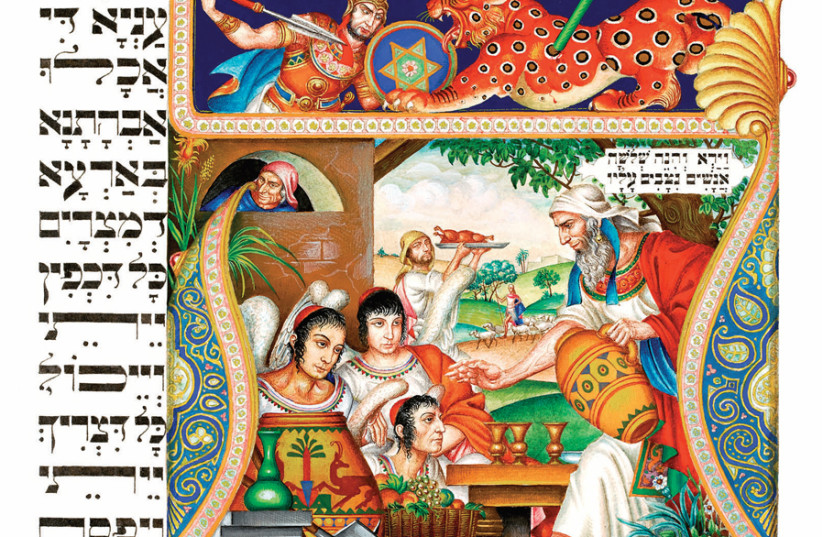Last Tuesday, before sundown on the last day of Passover, a peculiar seder was held -- a "Freedom for All" seder, hosted by If Not Now (INN), Jewish Voice for Peace, and The New Synagogue Project, with guests such as representatives Ilhan Omar and Rashida Tlaib.
The April 30 service was one of many radical left-wing anti-Zionist Passover seders held throughout the holiday, many of which were conducted as part of the programming for the anti-Israel encampments that had been erected on campuses across the United States of America in a bid to force administrations to adopt Boycott, Divestment and Sanctions policies and take a stance against the Jewish State. The anti-Zionist ceremonies were held using Passover texts, Haggadot, which appropriated the seders to transform them into struggle sessions for anti-Israel and intersectional activism.
The myth of the anti-Zionist seder
The anti-Zionist seder, as revealed by campus occupation social media and their Haggadot, wore the trappings of Jewish tradition, but hollowed out the Exodus story and the promises of establishment of the Hebrews in the land of Israel. The antizionist Passover celebration crowds out and decentralizes Judaism with a host of canonized activist causes, and weaponizes the Exodus story against Jews by casting Israelis as the new pharaohs in a perversion that would make Holocaust inverters blush.
The traditional Haggadot and Passover celebrations are discarded because their Zionism and particularism is embarrassing and irrelevant for those on a crusade for a pagan pantheon of foreign ideologies.
The central narrative and point of celebration in Passover is the liberation of the Jewish people by the hand of God from bondage in Egypt and into the land of Israel to serve him through the Torah that he gave them. Jews are commanded twice in the Torah to pass on the Exodus story so future generations understand their worship of God.
"Even if we were all old and well learned in the Torah, it would still be our duty to tell the story of the departure from Egypt," reads the Haggadah according to Rabbi Nathan Goldberg's version. "The more one tells of the departure from Egypt, the more is he to be praised."
The JVP Exodus From Zionism Haggadah does not tell the tale mentioned in its title at all. If Not Now (INN), Na’amod, and Jews for Racial and Economic Justice's Freedom For All version provides a glib and cursory poem that it suggests "to time it and see if you can finish in under sixty seconds!" The Families for Ceasefire (FFC) Philadelphia From the River to the Sea Haggadah offers one childish and quick retelling of the story that has only one mention of God, and another option that tells the story of Gaza with Exodus as a framing device.
Exodus to, and not from, the land of Israel
A Jewish Exodus cannot be faithfully recounted before the golden calf of wokeism, because of the narrative of the forming of the Israelites as a nation to fit the land of Israel and the story's particularism to the Jewish people. Passover story begins and ends not just with the redemption from slavery in Egypt, but the aspiration for us to return to the holy land.
"He brought us out from there that he might lead us to and give us the land which he pledged to our forefathers," Haggadot recalled Deuteronomy 6:23 at the end of the retelling.
It would have been preferable for the drafters of the anti-Haggadot texts if the Hebrews had continued to wander in exile and perpetual victimhood forever, living in tents like the encampment activists, as in the JVP Haggadah introduction they note bitterly "that the Exodus story doesn't end" with the crossing of the Red Sea.
"The Israelites would go on to wander for forty years in the desert before killing and displacing people in pursuit of the Promised Land," JVP bemoaned.
The Freedom for All text in its commentary of Dayenu, in which Jews thank God for gifts so great that each one would have sufficed, argued that God should have stopped before granting the Jews the land of Israel and sites to practice Judaism.
In the stead of Hallel, psalms of praise for the kindnesses bestowed by God and against reliance on idols and the works of man, JVP presented an essay rejecting the idea of the traditional holiday celebration and Haggadah as a holiday of freedom because of its Zionist sentiment.
"Can this be a holiday of liberation when it rests upon the fantasy of a divine land grant and colonial project whose death toll this winter we already cannot count? When the story it tells (both in its broad arc and specific gestures is part of what feeds the genocide?" Demanded the essay, which goes on to criticize God for the performance of the ten plagues that secured the Israelites' freedom, calling them acts of genocide. "None of these are incidental details that can be reinterpreted away. Removing ten drops does not make a full glass of wine into less of a celebration; it just provides the thinnest of emotional alibis. These genocide warrants, these celebrations of genocide, these acts that enable more genocide, are the core of the story."
The essay continued to ask readers not only which parts of Exodus should be cast aside to create "a Jewish liberation holiday that is not wrapped around genocide warrants and theocratic state-building" but attacks Hannukah and Purim as well. We don't yet have "a liberation holiday that doesn't trade other people's freedom, other people's lives in Mitzrayim, in Canaan, in Shushan, in the Greek-speaking Jewish world the Maccabees sought to annihilate, in Palestine."
"Next year in Jerusalem"
While the Haggadah service normally ends with Jews proclaiming "Next year in Jerusalem," as noted by the River to the Sea anti-Haggadah, "In modern times this can feel like an expression of Zionism -- which is why we won’t be singing it."
Instead FFC wrote to declare "From the river to the sea, Palestine will be free!" At INN anti-seders they said "next year in freedom." In Tzedek Chicago's seder supplement Hearkening to the Voice of Gaza, they did call for next year in Jerusalem and Al-Quds, but as a "commitment to the true and total liberation of Jerusalem." JVP failed to make any proclamation, likely because the aspirations of the Jewish people are irrelevant. Exodus and the Haggadah are not palatable because of their Judeocentricism.
At the beginning of the seder during the blessings over the first cup of wine, Jews praise God for choosing and exalting them from among all peoples by giving them the responsibilities of his commandments. They continue to thank God for creating "distinction between Israel and other nations." The Passover story details how the Israelites became a distinct nation in Egypt, with part of the revelation of God being how the Hebrews were removed as a nation "from the midst of another." Distinction is central to the holiday itself, not just structured with observances to make the nights "different from any other" nights, but directly demanding attention to the celebration's unique features.
In an essay instead of the first cup Kiddush, JVP struggles with the idea of sanctification through separation by acknowledging distance from the situation of Gaza but making it "ever-present" -- not separate from that nation. JVP's anti-Haggadah reflected on a Palestinian essayist who writes that others should think of themselves "in relation to the legacy of the shaheed" -- assuring that the word has many meanings.
The contrast in the way Haggadot and anti-Haggadot perceive the Exodus's relation to Jews and other people is a core conflict between Jewish tradition and new cult beliefs. Judaism is not a universal religion -- it is not demanded that the rest of the world practice it -- and while lessons can be gleaned from the Passover story, its message is not about pursuing an all-inclusive crusade for global liberation. This is unacceptable to the assimilationist purposes of paganistic intersectionality, which is a universalist and proselytizing religion.
Citing Palestinian academic Edward Said, the Freedom for All anti-Haggadah explains that "in order to view the Exodus as a leftist universal, we must put aside a number of aspects" such as "shocking commandments" and "behavior towards the people of the land of Canaan." INN and the other anti-Zionist authors suggest challenging the texts over the contradiction with different ideas that they hold, including questioning the idea that the Exodus story is a "a uniquely admirable and inspiring one for liberation movements."
JVP explains that the Passover ritual should be appreciated but one should "notice the ways it fails us as it has failed our ancestors for generations. We are here to face the contradictions and we are here to hold each other in the struggle."
Tzedek Chicago argued in its supplement that celebrating Passover in a way that "focuses exclusively on Jewish trauma" rather than Palestinians means that one has not fulfilled the Passover seder requirements. Even the recent trauma of the hostages kidnapped by Hamas, when people the world over echoed Moses in demanding of tyrannical terrorists "let my people go," is too particular to Israelis and Jews. The hostages are only briefly mentioned to equivocate imprisoned Palestinian terrorists with hostages, and call for their release as well.
In Aaron Moore Ellis's Four Questions for Times of Genocide in the JVP anti-Haggadah, it is argued that if Jews celebrate Passover "amidst genocide" from a Judeocentric perspective, "a triumphant celebration of our ancestral escape from slavery," then "pride and joy will only underscore our deep shame."
"Does this year’s Passover finally show that Pesach cannot be a collective celebration — but rather, our collective acknowledgment of shame? This year Pesach is a shonda, begging a different kind of commemoration," suggested JVP. Celebration of the Jewish holiday at all shouldn't be accepted, as "This is a time for mourning. Not celebration. This year we do not celebrate our liberation. We mourn ongoing genocide in which we are intertwined, through our tax dollars, our religious, cultural, and political institutions, our identities, our own stories of liberation."
Reclining in line with seder tradition should be forbidden when Palestinians' homes have been destroyed, according to JVP, and the festive meal shouldn't be eaten because Gazans are starving. There is no joy to be had in the escapism of Jewish heritage. The cause must be ever present.
The purpose of Passover is not the Jewish people, according to anti-Zionist progressive Jews like JVP, who say that "Passover is ours to own and continuously define," even as they complain that the Israeli government "purports to speak in the name of all Jews." Speaking on behalf of the vast majority of Jews on how Passover should be celebrated, these fringe groups believe they "are wrestling back our beloved tradition from these oppressive co-optations and re-rooting in the values passed to us." These values are not Judaic values, but an all-subsuming pantheon of ideas, requiring that Passover be a universal holiday of general freedom and liberation for all.
"None of us are free until all of us are free," JVP New Haven and Jews for Ceasefire wrote on social media about their seder on April 23.
Groups involved in the New York University Encampment wrote on Instagram on April 22 that the Exodus is a "reminder to always fight for liberation" that "dares us to keep seeing ourselves as present in that struggle."
Virtue signalling
With Passover a holiday for general liberation, the anti-seders and anti-haggadot predictably become over encumbered with every cause imaginable. JVP begins its seder with a virtue signal about continuing to wear masks because "We are still not safe from COVID," dipping the Karpas herbs into salt water is a dive into climate change, and washing hands requires brainwashed eulogizing of eco-anarchist anti-cop radical Manuel Terán.
It is fitting that the anti-seders copy emulates their traditional counterparts seder plate, which is symbolic of the seder, organizing a shank bone, an egg, two bitter herbs, a green herb or vegetable, and Charoset paste with a place and enough room for all. The anti-seder plate is overloaded with any number of additions depending on the anti-Haggadah -- strawberries for Gaza, olives for Palestinians, watermelon for Palestinian resistance, orange for feminist or LGBTQ rights, Acorn for Native North Americans, Garlic for Jewish mysticism, spoons for the homeless, locks for the incarcerated, and tomato for migrant workers. The anti-seder plate, like the anti-seder itself, crowds out Judaism. It cannot be seen among the universal sludge on the plate.
The already long seder is replaced with blocks of texts about anything but the exodus and Jewish religion. Important sections are cut or trivialized, to the point that anti-haggadot only loosely resemble traditional haggadot because of token adherence to the seder structure. If modern Jewish concerns are included, such as the October 7 Massacre and the taking of hostages, it is only in passing like in the Freedom for All text or for FFC's comparison to Israeli action "hurting, killing, and kidnapping even more people." The great Jewish sages who kept Jewish tradition alive are replaced with Black Liberation Army convicted murderer Assata Shakur; Palestinian poet Refaat Alareer who allegedly called most Jews evil, joked about the October 7 Massacre, and compared it to the Warsaw Ghetto uprising; and Palestinian activist Mohammed el-Kurd who in January called to "normalize the massacres as the status quo.”In line with the universalist mindset of the progressive anti-Zionist seder, the story that needs to be told is not the timeless Exodus tale, but whatever story needs to be told that year -- which is why new versions of these Haggadot are issued annually. This year, as the Israel-Hamas War waged on in the wake of the terrorist group's October 7 Massacre, the needed story is of so-called Israeli genocide against Gazans.
Every aspect of the seder has been hijacked to propagandize about the situation in Gaza. During Kiddush, JVP contends that we "cannot say 'water' and not also say 'Gaza,'" because of a dispute over the resource in the Levant. Matzah's purpose is not to remember Jewish affliction, but according to the Freedom for All text, the starvation of Gazans.
"Why is this Passover different than other Passovers?" posed JVP. "Genocide. The unique scale, and devastating brutality of the current extreme escalation in Israeli state violence."
As with all vehicles hijacked by such radicals, the universalist message is weaponized to ram against enemies of intersectional ideological canon. Celebration of Passover, if JVP and INN would have their way, would be an attack on Israel.
"This year the people of Gaza are in Mitzrayim," read the JVP anti-Haggadah. "This year the Israeli government is Pharaoh."
The Tzedek Chicago supplement compares Pharaoh's order to murder every newborn Jew to that of Palestinian children killed during the fighting between the IDF and Hamas, laying blame on Israel for its "genocidal assault on the people of Gaza."
The Freedom for All text cited Exodus 23:9, implying that Israelis are violating the commandment not to oppress a stranger as the Hebrews were in Egypt. For those who are quick to add context that the conflict began prior to October 7, they are even quicker to decontextualize that Israelis are no stranger to Palestinian actors like Hamas and their genocidal intentions that result in the consequences shamelessly dubbed "oppression."
Ignoring the role of Palestinians in the conflict, the same anti-Haggadah -- in a running theme among anti-Zionist progressive literature-- accused Israelis of "continuing violence and destruction of Palestinian life in the name of Jewish safety."
"If our freedom is dependent on the oppression of another people, we will never truly be free," read the Freedom for All Haggadah.
Whining about the problems Israelis cause them, JVP in its Haggadah described the "10 Spiritual Plagues of Genocidal Zionism."
INN and other groups, ever critical of God, noted that "The telling of the Plagues is not a comfortable part of the seder," but that freedom does not come bloodlessly and suggests that Israel may need to suffer plagues to force them to accept their policies of "collective liberation."
Activism in the strange service of various idols like "collective liberation" is what the desecrated anti-Zionist Passover is about. While traditional Passover is about praising God for what he has granted, JVP and other groups make demands for what they want granted. The Freedom for All version of Dayenu does not say "It would have been enough," but "It is not enough," demanding departure from particular concern about antisemitism to add opposition to Islamophobia, to not just fight for one's own rights and safety but to help others. JVP said Dayenu only after making demands for "Palestinian liberation" and "from the river to the sea Palestine will be free."
It will never be enough for such cultural imperialists. The pursuit of "collective liberation" is but one of many objectives that turns Passover into a celebration of everything, and therefore nothing. The holiday that is supposed to be different from any other night would become just like any other, in service of constant woke jihad like every day.
The anti-Haggadot and anti-seders claimed to part of an endeavor to create "collective Jewishness beyond Zionism," which is nothing but the abandonment of heritage, legacy, and tradition to put a skinsuit on modern political messages that become as stale as matzah by the time the next holiday rolls around. The current golden calf cause praised by anti-Zionist left-winger will have been melted down and cast into some other idol for the next anti-seder.
As they will be for any cause but their own, it makes sense that these organizations identify with the wicked son of the four Passover sons in the Haggadah, whitewashing and creating apologia for the heretic. The River to the Sea text removes the divisions between the questioners, as their differences and identities are irrelevant as long as the question being asked is "about what’s happening in Palestine." Freedom for All exchanges the wicked son for "the frightened child," who asks why they are talking about old stories -- which are only told to "change our present and create our future—our freedom—together." JVP embraces the wicked child as "the oppositional child" who they praise because they know "their own truth, resisting interventions and taking a stand against convention."
In the traditional Haggadah the wicked son asks dismissively "what is the meaning of this service to you?" excluding himself from the Jewish people. Antizionist progressives ask this question to shame you for making it about yourself rather than every other people. The Haggadah explains that if such wicked children were in Egypt at the time of the Exodus, they "would not have been redeemed." They would remain in the narrows, content to be another people among many, enslaved to strange and foreign gods.



